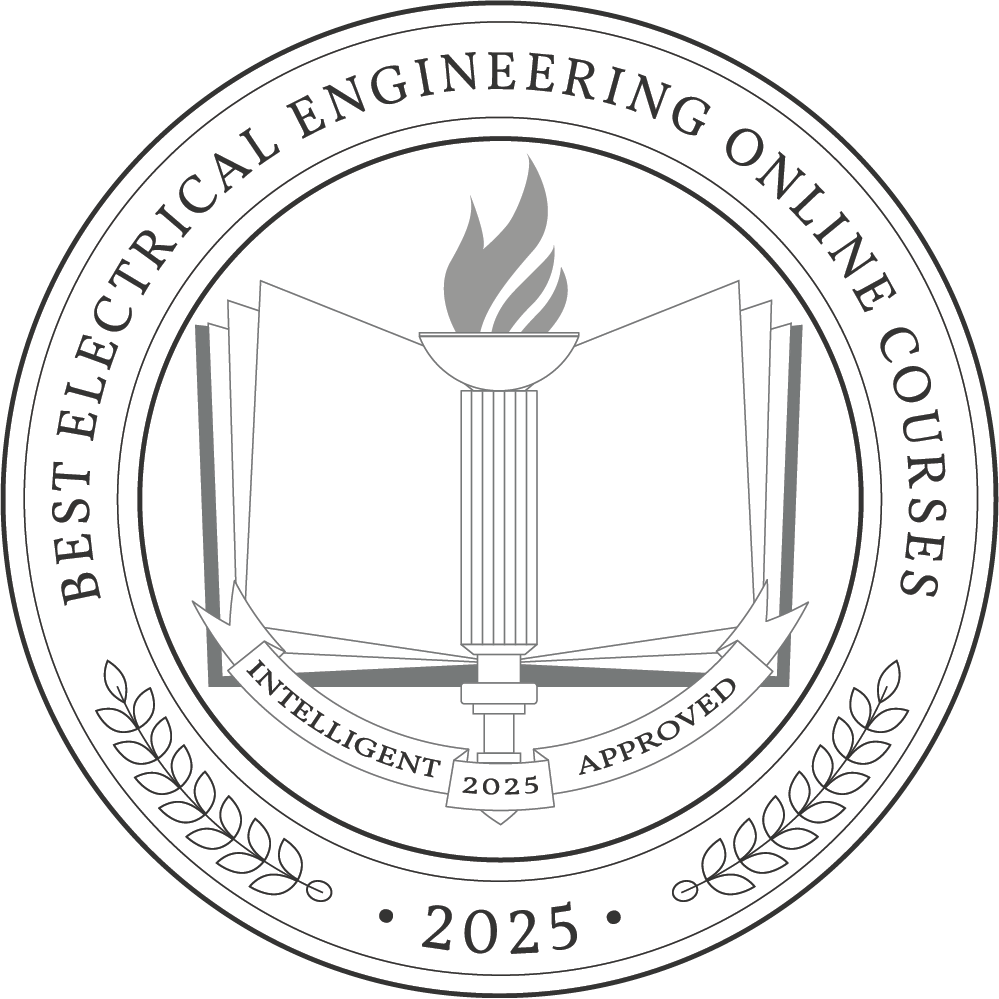Electrical engineering is a high-demand field with plenty of opportunities for skilled workers to find gainful employment. For students and professionals interested in pursuing a career in this industry, taking an online electrical engineering course is a great way to develop the foundational skills and knowledge you need to get started. To help you find the best courses available, we researched and reviewed the eight best electrical engineering online courses.
- Coursera — Introduction to Electronics by Georgia Tech — Top Pick
- Coursera — MOS Transistors by Columbia University — Best for Microelectronics Engineers
- Udemy — Electrical Engineering Simulations with Etap — Best for Learning ETAP
- Udemy — Electronics Engineering Technology Fundamentals — Best for Hobbyists
- Udemy — Fundamentals of Electrical Controls — Best for Controls Electricians
- Alison — Electrical Engineering – Electrical Transformer Components — Best for Interactive Learning
- Alison — Introduction to Basic Electrical Drawings and Test Equipment — Best for Learning Electrical Drawings
- Alison — Introduction to the Electrical Trade — Best for Beginner Electricians
Our Ranking Criteria
Our list is based on basic and advanced criteria conducive to student success. We reviewed around 30 online courses based on these factors and narrowed our list down to the top eight to help you find the electrical engineering courses most likely to set you on the right path in your career.
Basic ranking criteria
To set students up for success, it’s important that online courses offer the flexibility, learning environment, and resources students need to complete the course while balancing their other obligations. Course length, requirements, schedule flexibility, and certifications all impact the likelihood of positive student outcomes.
Time to complete. Shorter course lengths allow students to quickly develop the skills they need to take the next steps toward their new careers. With few exceptions, the courses on our list can be completed within a few days or weeks.
Prerequisites required. Course requirements make it difficult for beginners to get their foot in the door and start their new career paths. To ensure the options on our list can accommodate as many people as possible, we looked for courses that do not require any prerequisites or have relatively easy requirements.
Flexible schedule. Many online course participants are working professionals or university students, making it important for courses to offer schedule flexibility. The courses on this list can be taken on a self-paced basis and offer flexible deadlines for coursework.
Certificate of completion. While not a requirement, we placed extra value on courses that offer certificates of completion as they can be a great way to boost your resume and impress potential employers.
Advanced ranking criteria
We also reviewed courses based on several advanced criteria specific to electrical engineering. These factors help ensure that students learn in-demand industry skills and technologies and develop the soft skills they need to find long-term employment.
- The course is taught by expert instructors with professional electrical engineering experience.
- The course teaches technologies, like AutoCAD, commonly used in the electrical engineering industry.
- The course discusses potential career opportunities for electrical engineering students.
- The course teaches electrical engineers the critical thinking and problem-solving skills to succeed.
- The course teaches basic circuit design.
- The course includes real-world projects that allow students to apply their skills and gain practical experience.
- The course covers in-demand topics like power electronics.
8 Best Electrical Engineering Online Courses
Coursera
Introduction to Electronics by Georgia Tech
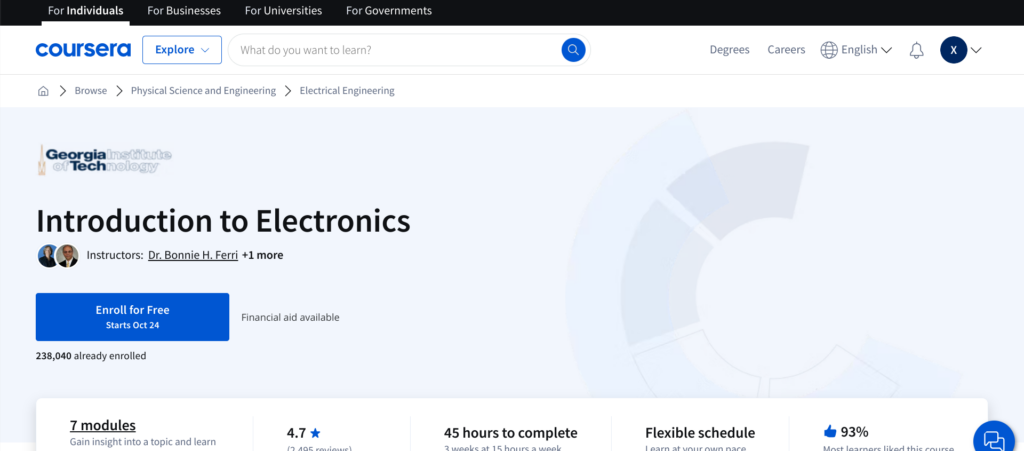
Intelligent Award: Top Pick
Introduction to Electronics by Georgia Tech is our top pick due to its beginner-friendly structure and comprehensive curriculum covering important topics like diodes, transistors, and op-amps. By the end of the course, students will have a great understanding of basic electronics and circuit design. Students will learn through pre-recorded lectures and quizzes totaling approximately 45 hours of course content. The course can be audited for free, but to receive a certificate and access graded assignments, students must unlock the full course for $49. Students can take the course self-paced and take advantage of its flexible deadlines to complete the work on their own time.
- Price: Free ($49 for certificate)
- Time to complete: 45 hours
- Prerequisites required: None
- Flexible schedule: Yes
- Includes verified certificate of participation: Yes
Who should take this course? Georgia Tech’s Introduction to Electronics is a great option for beginners in electrical engineering and engineering students who need a refresher on electronics and circuit theory.
| What we like | What we don’t like |
| Beginner-friendly curriculum | Certificate costs an additional $49 |
| Excellent student reviews | |
| Flexible deadlines |
Coursera
MOS Transistors by Columbia University
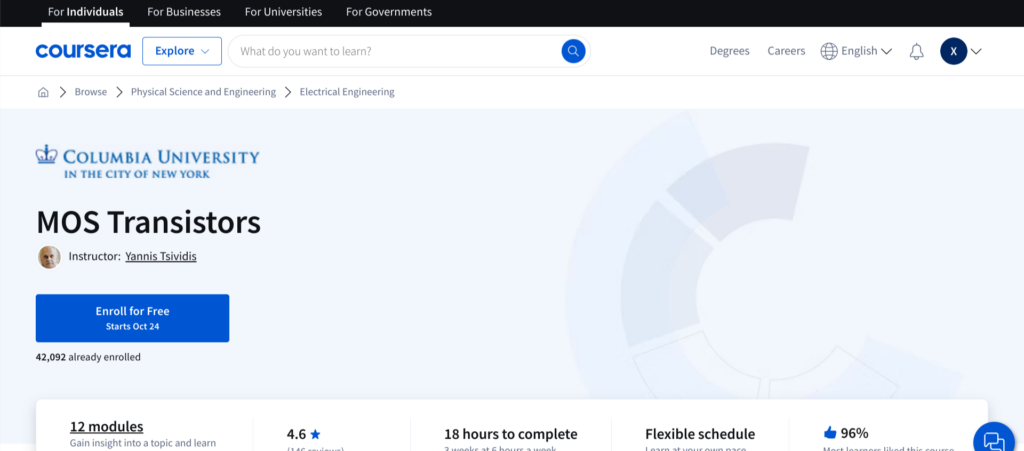
Intelligent Award: Best for Microelectronics Engineers
MOS Transistors by Columbia University provides a focused curriculum dedicated to helping engineers learn how MOS transistors work and how to model them. This information is essential for device modelers, circuit designers, and microelectronics engineers, making it ideal for engineering students and professional engineers who must establish these fundamentals to advance their careers. While the course has no prerequisites, it is not suitable for beginners as it contains difficult assignments for which students will likely need a background in electrical engineering. The course is available for free, including all lectures and assignments, but it does not offer a certificate of completion.
- Price: Free
- Time to complete: 18 hours
- Prerequisites required: None
- Flexible schedule: Yes
- Includes verified certificate of participation: No
Who should take this course? Due to the focused subject matter, this course is best for microelectronics engineers and engineering students who need foundational knowledge of MOS transistors.
| What we like | What we don’t like |
| Specialized curriculum | No certificate of completion |
| Practical assignments | Not suitable for beginners |
Udemy
Electrical Engineering Simulations with Etap
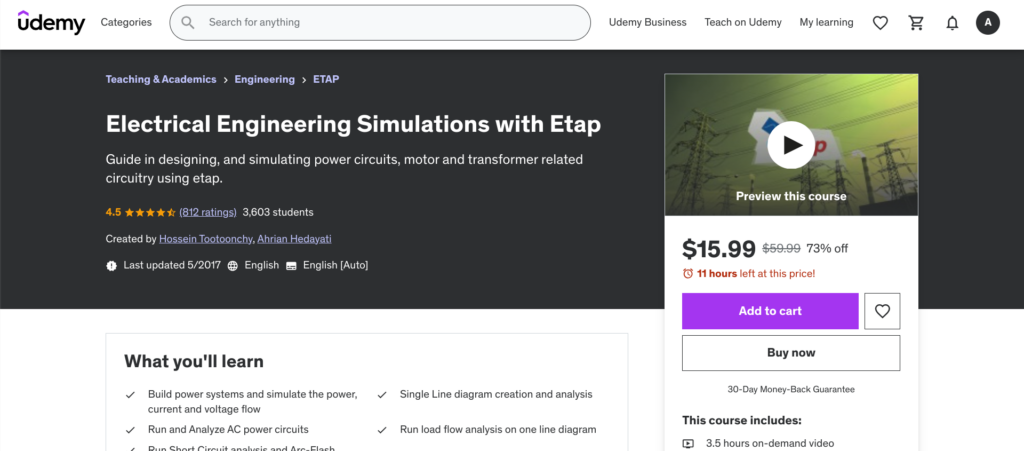
Intelligent Award: Best for Learning ETAP
ETAP is an in-demand software that electrical engineers need to learn to design and simulate power circuits. This course by Udemy provides an excellent introduction to this software for individuals interested in a career as an electrical engineer. Students will learn how to use ETAP to build power systems, run and analyze AC power circuits, and create single-line diagrams. Course participants have the opportunity to earn a Coursovie Training Certificate as well as the certificate of completion offered by Udemy. Students are granted lifetime access to the course’s 3.5 hours of on-demand video and downloadable resources. ETAP access is not provided, so students will have to obtain the software independently.
- Price: $59.99
- Time to complete: 3.5 hours
- Prerequisites required: None
- Flexible schedule: Yes
- Includes verified certificate of participation: Yes
Who should take this course? This course is designed for working electrical engineers, engineering students, and researchers who need to learn how to use ETAP to design and simulate power systems.
| What we like | What we don’t like |
| Teaches in-demand software | Students must pay for ETAP to take the course |
| Lifetime access to course materials |
Udemy
Electronics Engineering Technology Fundamentals
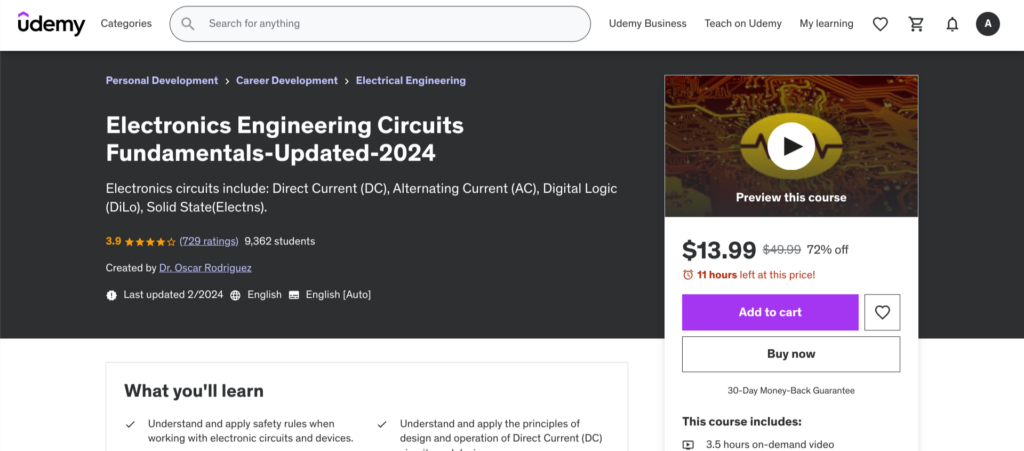
Intelligent Award: Best for Hobbyists
Electronics Engineering Circuits Fundamentals is a great option for hobbyists interested in understanding how to safely design, operate, and work with electronics. The course requires a basic understanding of algebra and trigonometry to complete. Through lectures, lecture notes, and quizzes, participants will learn basic concepts including direct currents, alternating currents, electronic circuits, and safety. The course does not delve into advanced topics, so it’s not an ideal choice for engineering students or professionals. The course also includes circuit design and computer simulation demos to give students the fundamentals to begin designing and building basic circuit systems.
- Price: $49.99
- Time to complete: 3.5 hours
- Prerequisites required: Basic algebra and trigonometry
- Flexible schedule: Yes
- Includes verified certificate of participation: Yes
Who should take this course? This course is designed for hobbyists and new engineering students who want to learn the basics of building and working with electronics.
| What we like | What we don’t like |
| Great for beginners | Does not cover advanced topics |
| Lifetime access to course materials |
Udemy
Fundamentals of Electrical Controls
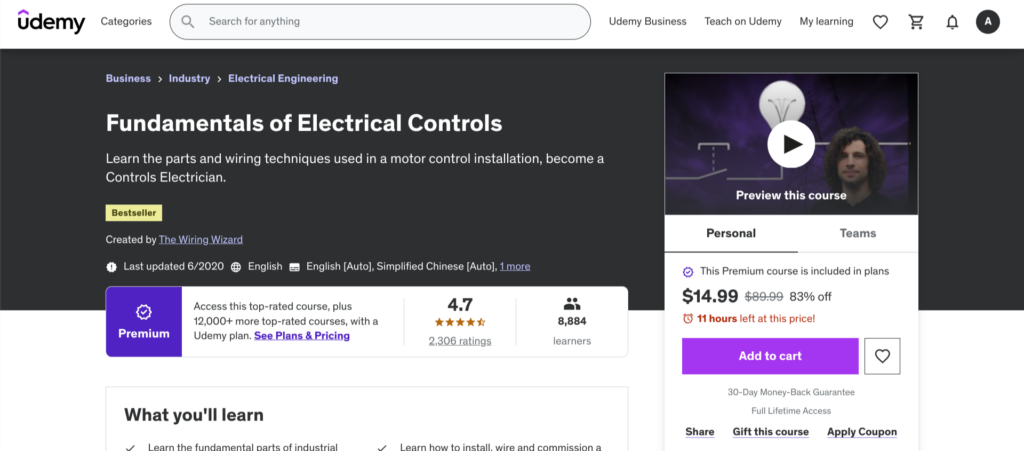
Intelligent Award: Best for Controls Electricians
This Udemy course helps students develop the skills and knowledge needed to start a career as a controls electrician. Students will learn the fundamental parts and functions of industrial control boards, how to repair and maintain control systems, how to install motor controls, and how electrical control components work. The course contains four hours of on-demand video and 13 downloadable resources for students to further their education. While there are no required prerequisites, it is recommended that students have some prior knowledge of electrical circuits to better understand course materials.
- Price: $89.99
- Time to complete: 4 hours
- Prerequisites required: None
- Flexible schedule: Yes
- Includes verified certificate of participation: Yes
Who should take this course? It is best for aspiring and practicing electricians who need a refresher on motor control basics.
| What we like | What we don’t like |
| Lifetime access to course materials | Does not cover advanced electrical engineering topics |
| Excellent student reviews | |
| Teaches in-demand skills |
Alison
Electrical Engineering – Electrical Transformer Components
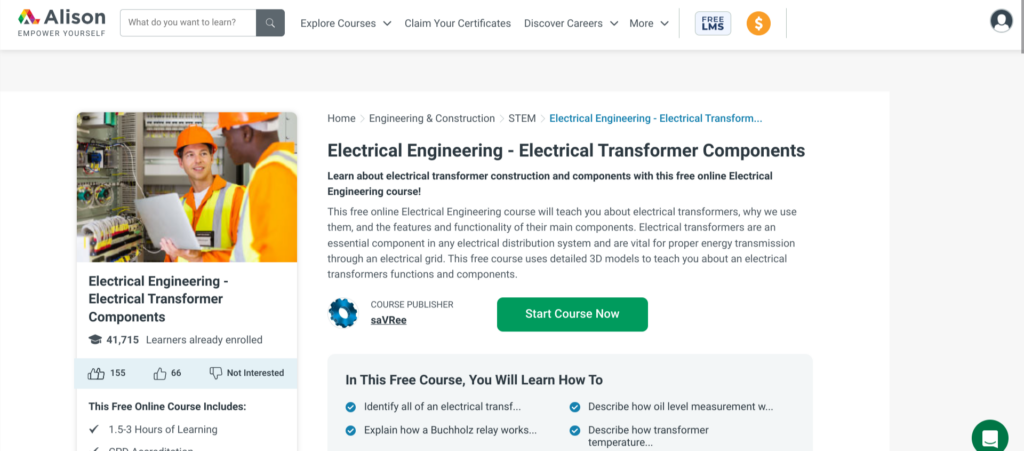
Intelligent Award: Best for Interactive Learning
This course by Alison is a great option for those who want to take a break from mundane lectures and video lessons in favor of interactive learning by utilizing 2D and 3D models and animations. The course uses these interactive models to help students learn exactly how each part of an electrical transformer works. Students will learn important concepts, including how Buchholz relays, silica gel breathers, and tap changers work. Upon completion, students can purchase a digital or physical certificate for $39 or $49 to verify their newfound skills.
- Price: Free
- Time to complete: 1.5 to 3 hours
- Prerequisites required: None
- Flexible schedule: Yes
- Includes verified certificate of participation: Yes
Who should take this course? It is ideal for any aspiring or working electrical engineer who prefers to learn through interactive lessons.
| What we like | What we don’t like |
| Interactive learning tools | Certificate costs extra |
| Short course length |
Alison
Introduction to Basic Electrical Drawings and Test Equipment
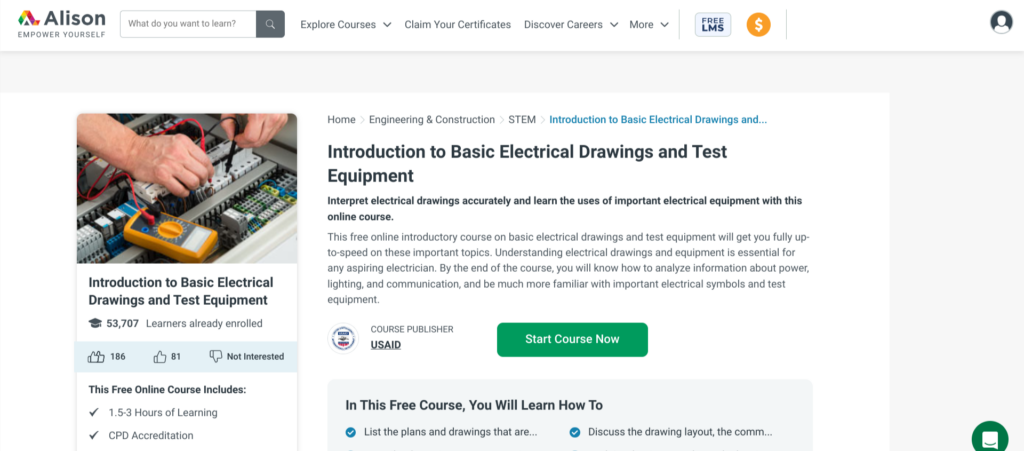
Intelligent Award: Best for Learning Electrical Drawings
Knowing how to interpret electrical drawings is a key skill that many of the courses on this list gloss over. This course by Alison aims to help students and electrical engineers learn this important skill and covers other important topics like scale drawings, power plans, electrical details, and diagrams. The course is accredited by Continuing Professional Development (CPD) UK, and after finishing the course, students can purchase a certification from Alison to verify their competency on the subject. By the end of the course, students will be able to read wiring and cable connections for proper electrical installation and maintenance.
- Price: Free
- Time to complete: 1.5 to 3 hours
- Prerequisites required: None
- Flexible schedule: Yes
- Includes verified certificate of participation: Yes
Who should take this course? It is ideal for students and practicing electrical engineers who want to improve their ability to read and interpret electrical drawings accurately.
| What we like | What we don’t like |
| Teach in-demand skills | Curriculum does not include advanced topics |
| Accredited by CPD UK |
Alison
Introduction to the Electrical Trade
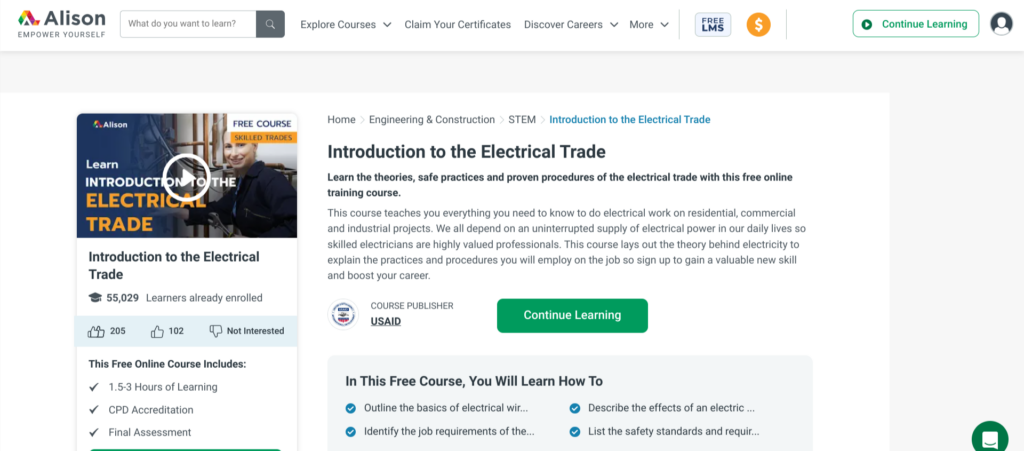
Intelligent Award: Best for Beginner Electricians
Introduction to the Electrical Trade is the ideal course for aspiring electricians with no background in the trade. The course prepares students for work as an electrician in residential and industrial settings. Students will learn about potential career opportunities, safety procedures, electrical circuits, electrical theory, and everything else they need to jumpstart their new careers. You will also gain the necessary soft skills, like critical thinking and troubleshooting, to succeed in this career path. After finishing the course and passing the final assessment, you can purchase a certificate of completion.
- Price: Free
- Time to complete: 1.5 to 3 hours
- Prerequisites required: None
- Flexible schedule: Yes
- Includes verified certificate of participation: Yes
Who should take this course? Individuals interested in pursuing a residential or industrial electrician career will benefit from the subjects covered in this course.
| What we like | What we don’t like |
| Great career training | Not ideal for electrical engineering students |
| Explains potential career paths following course completion |
Online Course Comparison Chart
| Course | Price | Features |
| Coursera — Introduction to Electronics by Georgia Tech — Top Pick | Free ($49 for certificate) | ✓ No prerequisites required
✓ Flexible Schedule ✓ Certificate of completion |
| Coursera — MOS Transistors by Columbia University — Best for Microelectronics Engineers | Free | ✓ No prerequisites required
✓ Flexible Schedule X Certificate of completion |
| Udemy — Electrical Engineering Simulations with Etap — Best for Learning ETAP | $59.99 | ✓ No prerequisites required
✓ Flexible Schedule ✓ Certificate of completion |
| Udemy — Electronics Engineering Circuits Fundamentals — Best for Hobbyists | $49.99 | X No prerequisites required
✓ Flexible Schedule ✓ Certificate of completion |
| Udemy — Fundamentals of Electrical Controls — Best for Controls Electricians | $89.99 | ✓ No prerequisites required
✓ Flexible Schedule ✓ Certificate of completion |
| Alison — Electrical Engineering – Electrical Transformer Components — Best for Interactive Learning | Free | ✓ No prerequisites required
✓ Flexible Schedule ✓ Certificate of completion |
| Alison — Introduction to Basic Electrical Drawings and Test Equipment — Best for Learning Electrical Drawings | Free | ✓ No prerequisites required
✓ Flexible Schedule ✓ Certificate of completion |
| Alison — Introduction to the Electrical Trade — Best for Beginner Electricians | Free | ✓ No prerequisites required
✓ Flexible Schedule ✓ Certificate of completion |
Tips for Succeeding in an Online Electrical Engineering Course
1. Consider the cost
How much do online electrical engineering classes cost?
Electrical engineering courses are generally very affordable, with all the options on our list being free or under $100. However, it’s important to consider that many free options require students to pay extra for a certificate of completion. Some platforms, like Coursera, offer financing options to those who cannot afford the upfront cost of the courses.
Will my employer pay for me to take the course?
Many employers reimburse employees who pursue education or training that enhances their job-related skills. Talk to your boss or HR department to determine whether or not financial assistance is available.
2. Get your tech squared away
Depending on the course, you may be required to download and use software that cannot run on all computers. Be sure to check with your course provider to determine what software you need to complete the course. A Windows or Mac computer with at least 8GB of RAM will be suitable in most cases. Also, ensure you can access a fast, secure, and reliable internet connection.
3. Use the right study resources
Using online study resources to supplement your coursework is a great way to improve your understanding of the subject and prepare yourself for your future in the field.
There are several electrical engineering study resources available online, including Wisconsin Technical College’s electronic digital library and Khan Academy’s electrical engineering resources.
Frequently Asked Questions About Electrical Engineering Courses
What jobs can you get after completing an electrical engineering course?
An online electrical engineering course won’t fully prepare you for a career in the field, as most jobs require at least a Bachelor’s degree. However, they provide the foundational knowledge you need to jumpstart your education.
With that in mind, common job titles in this field include electrical engineer, electronics technician, controls engineer, and electrical design engineer. The Bureau of Labor Statistics lists the average salary for electrical engineers as $109,010 per year.
Are there free online electrical engineering courses?
Yes, there are several free online electrical engineering courses available online. Some of the free courses in our list include Introduction to Electronics by Georgia Tech and Introduction to the Electrical Trade by Alison.
How long is the average online electrical engineering course?
Electrical engineering course lengths vary significantly depending on the provider and subject matter. The majority of the courses on our list can be completed in about four hours, while some may take several weeks to complete when taken on a part-time, self-paced basis.
Is it possible to get an electrical engineering degree online?
Yes, many reputable online universities offer electrical engineering programs. This includes Florida International University, Clemson University, Arizona State University, and the University of North Dakota.
Interested in a degree instead?
Learn more about online degrees, their start dates, transferring credits, availability of financial aid, and more by contacting the universities below.
